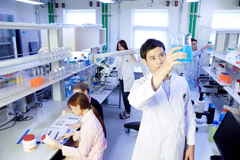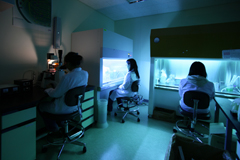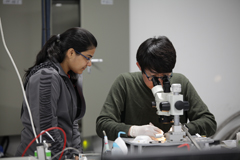


Research Center for Basic Science
Director: Prof. Young Uk KWON, Chemistry
The Research Center for Basic Science was established to develop theoretical and applied methods, and produce professionally advanced scientists through creative and original research in basic sciences, with the aim of cultivating world class research outcomes. It has been selected as the national key research center for the National Research Foundation’s ''Functional Nano New Material Research'' and is now carrying out this 3-step research project.
The institute is also participating in various theoretical and applied research projects in the field of biological science, mathematics, physics, and chemistry. It has received research grants of approximately 10 billion KRW and has produced numerous remarkable research outputs. This subsidiary organization also plays a role as an administrative support unit for the Institute of Basic Science.
Creative Research Institute for Quantum Materials and Superconducitivity (CQMS)
Director: Prof. Tu Son PARK, Physics
The Creative Research Center for Quantum Materials and Superconductivity (CQMS) was established not only to advance fundamental scientific knowledge, but also to educate young researchers so that they can become world leading experts. CQMS focuses on the discovery of new quantum materials and understanding of unconventional superconductivity that appears in the vicinity of a quantum critical point.
The major research topics are:
- Strongly correlated electron systems
- Unconventional superconductivity: heavy fermion systems, Fe-based and Cu-based high-Tc SCs
- Non-Fermi liquid behavior and quantum phase transition
- Synthesis of novel superconducting materials
Creative Research Initiatives for Smart Molecular Memory (CSMM)
Director: Prof. Hyo Yong LEE, Chemistry
This Creative Research Institute executes the leading research program of the National Research Foundation of Korea. By discovering the next generation of researchers who have inventive ideas and knowledge, we want to train them as world-class research leaders in their fields.
Since the 1960s, inorganic silicon semiconductors have developed a great deal. Along with the inorganic semiconducting device, organic semiconductors including organic light emitting diodes, organic thin film transistors, organic and molecular memory, and organic solar cells have been developed due to several advantages; they are low-cost and easy to be synthesized. Currently, we are focusing on research development of organic semi-conducting materials and devices including non-volatile molecular/organic resistive memory (M/O RM), organic thin film transistor (OTFT), organic light emitting diode (OLED), and organic photovoltaic cell (OPC) materials and devices.
In addition, we are also working on 2D materials including graphene oxide, reduced graphene oxide, graphene quantum dots; flexible transparent electrodes using Ag and Cu nanowires and nanoparticles, and transition metal dichalcogenide (TMD) materials and devices.
Chemical & Biological Detection Research Center (CBDRC)
Director: Prof. Jin-Hyo BOO, Chemistry
The Chemical & Biological Detection Research Center (CBDRC) was established by the funding support of the National Defense and Science on September 16, 2011 to develop science and technology for national defense, and to foster outstanding scientists in the area of chemical and biological detections.
The CBDRC will make further progress on the ability of national defense technology and build the foundation of essential techniques for national defense, through creative core researches into the specific technologies for chemical & biological detections.
Also, the CBDRC aims to secure international advanced technology and to activate groundwork for national defense technology. Diverse professional scientists who work at companies, universities, and research institutes are participating in the CBDRC. They cooperate with each other to develop the basic skills of defense and put technical invention to practical use.
Eventually, the CBDRC will contribute to raising the quality of human life in the field of medical treatment, health care, environmental protection, and quarantine inspection. The CBDRC will grow as an international research institute because of the many patents abroad and papers in renowned international journals.
Therefore, the CBDRC is sure to boost the reputation of Sungkyunkwan University world-wide.
Research Institute of Nano Bio Convergence
Director: Prof. Wan Soo YUN, Chemistry
Our research institute is focused on the investigation of creative ideas in frontier fields of nano and bio convergence, mainly performing the Pioneer Project of the National Research Foundation (NRF) of Korea. To fulfill the purpose of devising nanotech-based biosensors with ultra-high sensitivity, selectivity and reliability at the single-molecule-level, the research groups in our institute are developing state-of-the-art nano-analysis and nano-manipulation techniques utilizing specially-designed nanostructures and materials. Therefore, the research goal can be achieved only through a successful interdisciplinary collaboration between two different fields of technologies: nanotechnology and biotechnology.
It is expected that the results of the project will be applicable not only to biosensors, but also towards nano bio analysis platforms for various applications in the related fields of science, technology, and industries. Detection platforms with high-selectivity and sensitivity will also be applicable not only to diagnostics and therapeutics, but also to the discovery of diverse functional materials and devices that track harmful biomaterials in real-time, which may contribute to the improvement of the quality of life. We expect that this should make great strides in medical and life science via exploring unknown vital phenomena.
Institute for Science and Technology in Space
Director: Prof. Il Hung PARK, Physics
The Institute of Science and Technology in Space (ISTS), heavily supported by the Ministry of Science, ICT and Future Planning, and the Agency for Defense Development, was established on September 1, 2014, with the purpose of fostering talented scientists and developing scientific technology in the area of space research.
The organization is also aiming to establish a world-class research group which will lead to growth in future-oriented space science and technology. In other words, the ISTS is striding toward advancement in the industrialization of space technologies and human resource development, by carrying out government-led grant programs and converging fundamental sciences, including theoretical studies on space and applied sciences related to astronomy, outerspace research, and the national defense system.
A number of research projects, including inventing small-sized satellites and other types of the same kind equipped with optical and high-energy electromagnetic wave technologies are some of the key areas where the Institute’s major interests lie. In addition to these system technologies, it is expected that it’s progress in developing key components of advanced optical instruments, sensors, electrons, and super-micro machine and structure, which will be used in national defense mechanisms and industrial applications, will greatly contribute to the national interest and global scientific betterment.
By 2020, the ISTS envisions securing international competitiveness, and therefore will be able to develop into the top-tier research powerhouse staying abreast of the globally-renowned research centers and research-centered universities which deals with major space research projects worldwide.
Institute for Mathematical Science (IMS)
Director: Prof. Yong Do LIM, Mathematics
Established in 2015, the Institute for Mathematical Science (IMS) aims to advance the studies on theoretical and applied nonlinear ergodic theory by closely working with the international mathematics science society, based upon linear ergodic theory which has been studied and examined up until now. It also studies convex metric spaces and geometric probability measure theory in order to create research areas integrating related theories, such as geometry, analytics, probability, partial differential equation, and kinetics.
For two years, the center will primarily focus on ergodic type theorems of positive definite operators Jensen’s inequality and operator co-cycle theory for the Karcher mean of positive operator, and general ergodic theories on convex metric spaces (finding a construction scheme of contractive barycenter).
Center for Immune Research on Non-lymphoid Organ (CIRNO)
Director: Prof. Yong-soo BAE, Biological Sciences
CIRNO Center was established in the middle of 2017 with the Science Research Center program (SRC) supported by the Korea Research Foundation (KRF). Up to date, several immunological questions remain unclear with the limited knowledge on lymphoid immune system alone. Generally, non-lymphoid organ has been revealed to maintain immunosuppressive environments to protect organs from inflammatory responses when activated by lymphoid immune system.
The Center was launched to study on the organ-specific immune systems which may exist and control the immune homeostasis of each non-lymphoid organ such as liver, lung, kidney, pancreas, colon, prostate, and other genetic organs, etc. Precisely, we would like to investigate the organ-specific immune cells, immune cell network, immune-modulating molecules and their activity and mechanism of action in each non-lymphoid organ.
In addition, we are going to develop an in vivo nano-delivery technology to control the immunosuppressive environments by targeting organ-specific immune cells or organ-specific immune molecules, which may facilitate immune effector infiltration into non-lymphoid organ, leading to inhibition of tumor growth.
Through the research, the Center will provide a better understanding of the specific immune system of each non-lymphoid organ, and open a new paradigm in medical treatment of tumors residing in the non-lymphoid organ.



